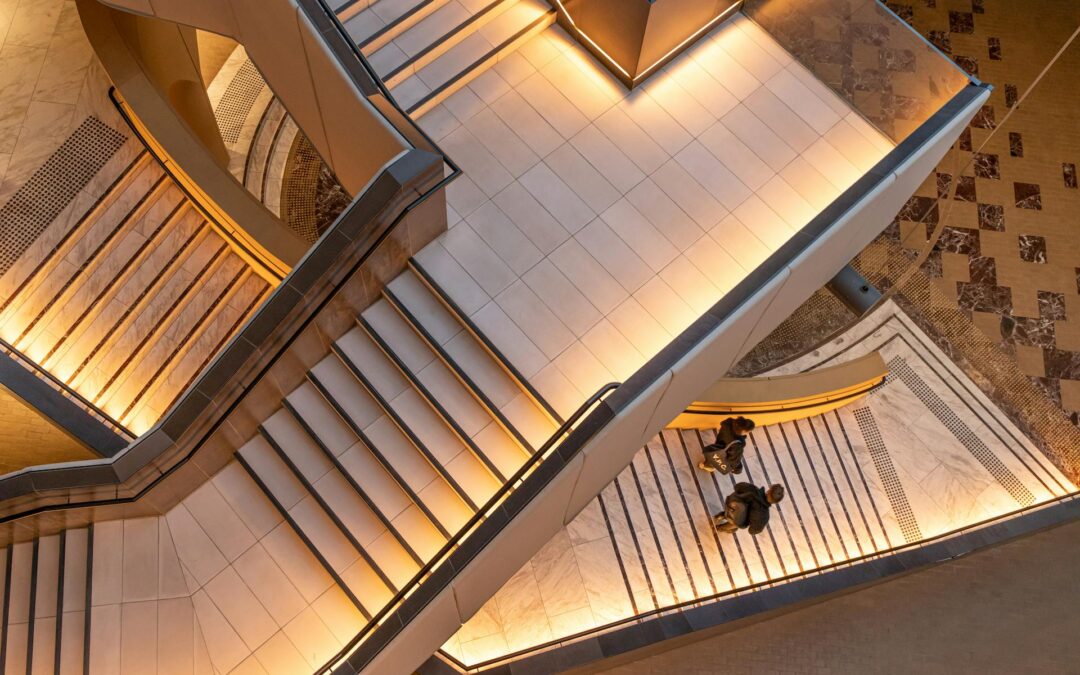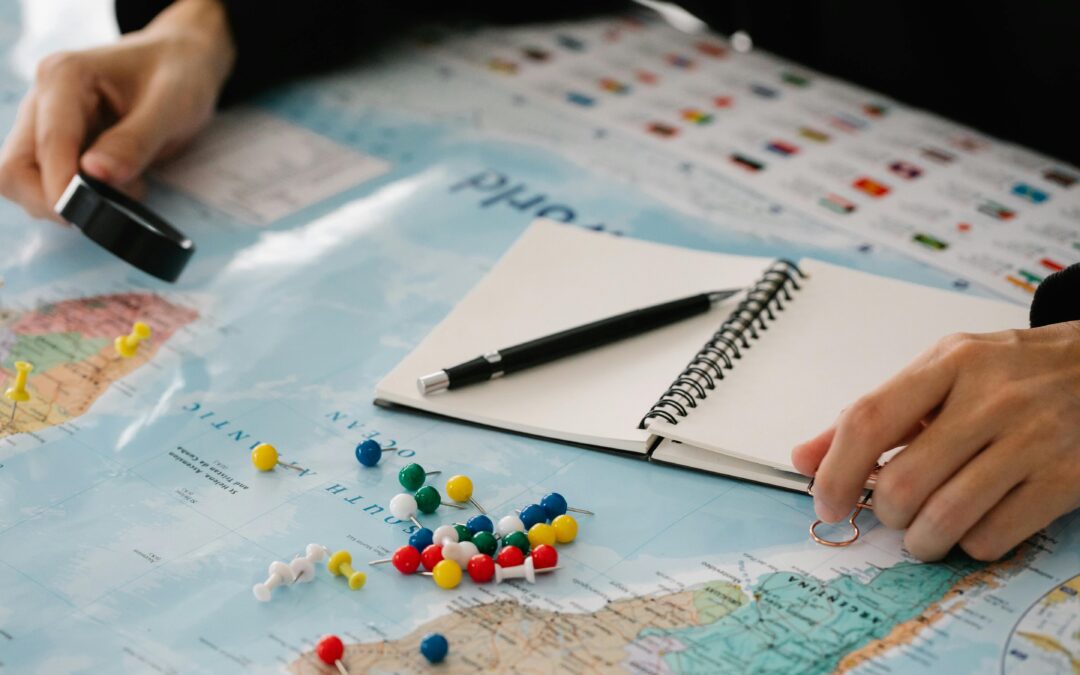Launching Soon: The Knowledge Diplomacy Mapping Initiative

The Knowledge Diplomacy Project (University of London Institute in Paris) and the Mapping the Arts and Humanities Project (School of Advanced Study, University of London) have collaborated to create the Knowledge Diplomacy Mapping Initiative: a dynamic, open resource that visualises the Knowledge Diplomacy Project’s global activities while also mapping UK diplomacy-related infrastructures.
In this post, Dr Tim Gore OBE (University of London Institute in Paris), Dr J. Simon Rofe (University of Leeds), and Dr Monja Stahlberger (University of London) discuss why understanding this landscape is the first step toward building stronger, more effective international partnerships.
Introduction
One of the things we’ve learned at the Knowledge Diplomacy Project is that global challenges transcend borders. Whether we are grappling with international climate policies, developing ethical frameworks for AI governance, or protecting cultural and intellectual heritage, these complex issues demand responses that go far beyond what a single discipline can provide.
Our Knowledge Diplomacy Project has tackled these globally challenging questions: how universities can contribute to climate resilience strategies, how humanities scholars can inform international AI regulation debates, and how higher education institutions can facilitate diplomatic dialogue in times of tension. Through this work, we’ve found that such global challenges are most effectively met through collaboration – not just between nation states, but between different institutions and knowledge systems. While this principle seems obvious, meaningful collaboration that transcends traditional boundaries remains surprisingly rare in practice, with many organisations still operating in isolation.
Beyond identifying shared pressures, the Knowledge Diplomacy Project also considers the conditions that make collaboration possible: the conferences, working groups, research networks, and joint institutional efforts that create spaces, both formal and informal where different forms of expertise can meet. We explore the many different forms such partnerships can take from joint research initiatives to cultural programmes, from policy advice to educational alliances. A central part of this work is providing a clearer view of the institutions, networks, and partnerships that shape the field of Knowledge Diplomacy. Since our launch in 2019, the project has worked with at least 75 organisations, convened 8 events, and engaged/networked participants
Through our work, it has become clear that many of these joint ventures in Knowledge Diplomacy happen out of sight – rarely leaving a public trace or record that would allow us to chart these relationships in a systemic way. By making these connections visible, the project invites cultural organisations, research centres, institutes, professional networks and associations, governmental bodies, and think tanks) that shape the field.
How do we make sense of these clusters of collaboration? Where, within the Knowledge Diplomacy landscape, are the points of connection between the public, private, and third sectors? How can we show the vital links that are transforming? And crucially, how do we create access points for policy makers, decision makers, and practitioners to engage with the evolving concepts and forms of diplomacy?
The Knowledge Diplomacy Project is proud to announce the upcoming launch of the Knowledge Diplomacy Mapping Initiative: an innovative platform designed to visualise and connect the expanding web of Knowledge Diplomacy infrastructures across the UK. It’s an urgent response to the need for greater visibility, coordination, and understanding of how knowledge and diplomatic practice intersect in addressing global challenges.
About the Map
Conceived as an active workspace for discovery, the map is designed to serve people working in Knowledge Diplomacy and the broader field of diplomacy. For the purposes of this project, we define Knowledge Diplomacy as the strategic use of education, research, and innovation to build international cooperation; diplomacy is understood as the practice of communication, representation and negotiation.
Building on the project’s mapping activities, and the facilities and opportunities they create, the Knowledge Diplomacy Mapping Initiative aims to explore how to visualise networks and partnerships in the sector and show where research in the field is taking place. For us, the process of mapping embodies an ongoing practice of networking that reflects the dynamic nature of Knowledge Diplomacy itself, which is why we felt it was more appropriate to call this resource a “mapping initiative” as opposed to a “map.” Mapping conveys the ongoing, iterative nature of this work and shows how diplomacy ecosystems are constantly evolving, new partnerships are forming, and innovative practices are emerging. Our approach recognises that understanding these networks and processes requires continuous engagement.
Owing to the Knowledge Diplomacy Project’s international scope, the KDPMI will also be playing into the Mapping the Arts and Humanities Project as an opportunity to experiment with how cross-border ties might be represented in the dataset in the future. A further contribution is the chance to think beyond the research infrastructures MAHP typically maps (university-based centres, learned societies, associations, independent research organisations) and to include infrastructures such as cultural and third sector organisations which may work closely with research institutions.
Finally, the Knowledge Diplomacy Mapping Initiative will also introduce new features, including two complementary views: the KDP Activity View (View 1) which offers a geographic layer and a timeline of seminars, workshops, and conferences (2019-2025) in a clean layout that keeps the project’s collaborative framework front and centre, along with The MAHP View (View 2) which presents a UK focused diplomacy-tagged infrastructures powered by the MAHP database.
What is Knowledge Diplomacy
Traditional diplomacy has long been the domain of government officials and formal diplomatic channels, focusing primarily on state-to-state relations through established protocols and bilateral or multilateral negotiations. However, the complexity of contemporary global challenges, such as climate change, artificial intelligence governance, and geopolitical crises, has revealed the limitations of these traditional approaches. Issues that transcend borders require new forms of diplomatic engagement that can draw on diverse expertise and foster collaboration across multiple sectors, while recognising the three key facets of Global Diplomacy: Representation, Communication and Negotiation (Holmes/Rofe, 2016) are still in operation in these newly identified actors.
Knowledge Diplomacy emerges from this need, representing both a concept and a practice that operates through higher education, research, and innovation to build and strengthen relations between countries and institutions. As a concept, it recognises that knowledge itself, whether this knowledge is scientific, cultural, or social, can serve as a bridge between nations and communities. As a practice, it involves the active engagement of universities, research institutions, cultural organisations, and civil society in diplomatic processes. This dual role of Knowledge Diplomacy is explored in depth in Knowledge Diplomacy: Regional Perspectives and Future Trends (MUP, 2026), a volume compiled and edited by the Knowledge Diplomacy Project.
The current diplomatic landscape is increasingly characterised by different prefixes that reflect specialised approaches including science diplomacy, cultural diplomacy, digital diplomacy, educational diplomacy, environmental diplomacy, and even sports diplomacy. Each prefix captures specific dimensions of how nations and institutions engage internationally. Therefore, unlike traditional diplomacy, Knowledge Diplomacy engages a broader spectrum of actors through networks of knowledge creation and exchange.
What distinguishes Knowledge Diplomacy from, for example, science diplomacy is its expansive scope, including scientific collaboration but also other forms of knowledge generation and exchange, such as social sciences, humanities, and professional education. As our project’s scope has shown, this broader framing reflects a growing recognition that contemporary diplomatic challenges require interdisciplinary approaches that draw on diverse forms of expertise and cultural understanding. This is particularly relevant when considering diplomat education at both ground level and as lifelong learning. The driving question is how do diplomatic practitioners understand the Knowledge Diplomacy ecosystem across their organisations? We believe that mapping helps make these connections more visible and actionable for both traditional diplomats and the wider community of Knowledge Diplomacy actors.
The boundaries between these diplomatic realms are increasingly blurred in practice and concept; and serves to create opportunities for collaboration. Our map highlights this vast field by providing a space where institutions engage in various forms of diplomatic knowledge work. The map enables us to discover more common ground and explore potential partnerships.
Who is This Map For?
The Knowledge Diplomacy Mapping Initiative is designed to serve multiple communities working at the intersection of knowledge and diplomacy.
For Higher Education Leaders, Researchers, and Academics: Early career researchers, established scholars, and institutional leaders can explore cross-disciplinary and international partnership opportunities, gain insights into their role within the evolving Knowledge Diplomacy landscape, and access a living dataset that supports comparative and longitudinal research in international education, global humanities, and soft power.
For Diplomacy Practitioners: Understanding that diplomatic practice exists beyond traditional chancelleries, the mapping provides a comprehensive view of knowledge-based diplomatic activities, enabling practitioners from a wide variety of sectors to identify potential collaboration opportunities and understand the broader ecosystem they operate within.
For Policy Professionals and Decision Makers: The platform will offer analytical tools that help identify key trends, gaps, and opportunities. This includes the ability to trace connections between policy challenges and the academic or cultural resources available to address them.
For NGO and Civil Society Networks: Organisations engaged in international knowledge sharing can understand how their work connects to broader diplomatic initiatives and as a result identify potential relevant partners.
As Tim Gore, Project Lead and CEO of the University of London Institute in Paris, notes: “We hope that using this descriptive methodology developed in the School of Advanced Study, we make this important project more accessible and open up the possibility of more interdisciplinary links.”
As fellow member of the Knowledge Diplomacy core group and co-editor of Knowledge diplomacy: Regional perspectives and future trends (MUP, 2026) Simon Rofe adds ‘the project has served to live up to its name in developing new networks of knowledge and connecting people and institutions across the globe in its concept and practice: our mapping initiative adds further textures to that in its visualisation and offers more exciting opportunities ahead.’
What Users Will Be Able to Do
Built to function as an interactive tool for exploration and a living directory of the field, the Knowledge Diplomacy Mapping Initiative will help stakeholders to:
- Identify key infrastructures within the UK’s diplomacy ecosystem, and trace the Knowledge Diplomacy Project’s international activities and partnerships.
- connections between organisations across, cities, regions, and institutions.
- Filter results by type, theme (tag), or location to focus on areas of interest.
- Visualise patterns from the most co-occurring themes to those used sparingly.
First and foremost, we’ve prioritised the map’s dynamism:
- the accompanying visualisations (such as the word clouds and network diagrams) update in real time, indicating potential gaps in representation or unexpected connections.
- “Filtering by type” is a new addition to the map that brings organisational activity into sharper focus.
- Users can also isolate funders or sponsors in the field, a tool that can be particularly useful for those seeking funding to support their work.
Whether scanning the field for potential collaborators, tracing thematic overlaps, identifying emerging areas of activity, or discovering underexplored disciplinary intersections, we hope the map will act as a thought-provoking resource, stimulating dialogue and acting as a springboard for new partnerships.
Join Us in Mapping the Future of Knowledge Diplomacy
More than a resource, the Knowledge Diplomacy Mapping Initiative stands as an invitation to be part of a growing community committed to understanding and strengthening the role of knowledge in international cooperation.
We need your expertise. Do you know of actors or collectives that should be part of the dialogue (and our map)? If so, we’d love to hear from you. Your suggestions will help ensure the mapping reflects the full richness and diversity of this evolving field. To see the infrastructures already covered, you can find them here!
We need your insights. We’re also seeking beta testers to participate in focus groups that will help us refine the platform’s functionality and ensure it meets the needs of the community. Contact us at [email protected] and [email protected]. Your feedback will be essential in making this tool as useful and accessible as possible.
The Knowledge Diplomacy Map is developed by the Knowledge Diplomacy Project at the University of London Institute in Paris, in collaboration with the Mapping the Arts and Humanities Project, School of Advanced Study.
Tim Gore is Chief Executive Officer of the University of London Institute in Paris. He has held senior leadership roles in career postings in France, UK, India, Jordan, Dubai, Singapore and Hong Kong and has substantial experience of higher education in a global context; cultural relations; diplomacy and commercial enterprise. His main expertise is strategy applied within higher educational contexts as well as in internationalisation of higher education and leadership. He has worked closely with a range of government organisations in the countries he has served and received the OBE for his work in India-UK bilateral relations while he was leading the British Council’s education work in India.
J Simon Rofe is Reader/Associate Professor of International Politics at the University of Leeds. He has written widely on all aspects of Diplomacy and is co-editor of the Manchester University Press, Key Studies in Diplomacy series. His work on Knowledge Diplomacy, catalysed alongside Dr Linda Amrane-Cooper in Berlin in 2019, focuses upon networks of knowledge and Diplomacy’s core characteristics of Representation, Communication and Negotiation. Dr Rofe was previously Deputy Director of the Centre for Online and Distance Education CODE. He was previously Head of Digital Learning (2016-2020) and headed the Knowledge Exchange and Enterprise portfolio (2020-22) at SOAS University of London. He has designed, developed and delivered under the aegis of the IR Model, numerous online learning programmes at a variety of HEIs, NGOs and other organisations, including the University of London’s Postgraduate Certificate in Higher Education.
Monja Stahlberger is Project Coordinator for the Knowledge Diplomacy Project at the University of London Institute in Paris, where she coordinates project communications and co-organises conferences and roundtables. She is also a Postdoctoral Research Fellow at the Leo Baeck Institute London. Her research expertise in cultural exchange, transnationalism, and cross-border identity formation directly informs her work in knowledge diplomacy. She completed her PhD in Exile Studies at the University of London.

Knowledge Diplomacy in Context
International collaboration strengthens global ties, but the vital infrastructure behind it often...

UK DARIAH Day 2025: Imagining Future Digital Research Infrastructures
As the landscape of arts and humanities research becomes increasingly digitised, the necessity for...

Law and the Humanities in Practice: Voices from the Sector
Across universities and cultural institutions, there is a growing recognition that the discipline...

Introducing the Knowledge Diplomacy Mapping Initiative
The Knowledge Diplomacy Mapping Initiative (KDMI), a new collaboration from the Knowledge...

Law and the Humanities: A Disciplinary Cartography
James Campbell (Centre for Socio-Legal Studies, Oxford) joins us on the Mapping the Arts and...

Mapping Knowledge, Building Trust: A New Phase for the Knowledge Diplomacy Project
Dr Monja Stahlberger discusses the Knowledge Diplomacy Project's new phase, launching an...

Knowledge Diplomacy Mapping Initiative FAQ
This FAQ is here to help you get the most out of the Knowledge Diplomacy Mapping Initiative. It...

Creating Living Systems Fit For Purpose: RESHAPED and the Future of Research Training
The Mapping the Arts and Humanities team sat down with SAS learning technologists Niilante...

Creative methods in research: how innovative arts-led approaches are driving changes across law, policing, and the humanities
Creative and arts-led methods are currently gaining ground in socio-legal and humanities research,...

Introducing LHub’s Law and the Humanities Map
This blog post shares key findings from recent focus groups on LHub’s Law and the Humanities Map....
